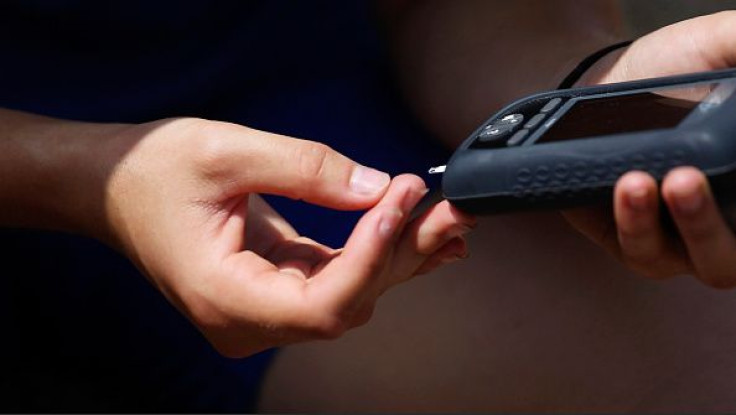Can Diabetes Be Reversed? Study Claims Weight Loss And Cutting Calories Cure Condition, Even In Long-Term Patients

Roughly 330 million people around the world have Type 2 diabetes; the cure for it may be as simple as adhering to a strict diet. In 2011, a team of United Kingdom researchers from Newcastle University published a study that showed Type 2 diabetes could be reversed in overweight and obese patients who followed a very low-calorie diet over the course of eight weeks to stimulate fat removal from around the pancreas.
The team set out to replicate their findings on a larger scale to see if the weight loss successfully kept diabetes at bay over the long term, and published their findings in the journal Diabetes Care. They found that in Type 2 diabetes patients, restrictive diets weren’t just a quick fix. Once the weight came off and insulin production began to function normally, patients stayed diabetes-free and were allowed to resume normal, healthy diets.
"The study answered the question that people often ask me — if I lose the weight and keep the weight off, will I stay free of diabetes? Yes!” said the study’s lead author Roy Taylor, a metabolism and medicine professor at Newcastle University. "What we have shown is that it is possible to reverse your diabetes, even if you have had the condition for a long time, up to around 10 years.”
For the study, researchers followed 30 participants over the course of six months as they maintained a calorie-restrictive diet of 600 to 700 calories a day — a third of what they were normally eating each day. According to the U.S. Department of Agriculture, the average adult should eat between 2,000 and 3,000 calories a day, depending on how physically active they are. The dramatic cutback on calories was intended to cause weight loss that would be significant enough to make a difference in an overweight or obese person’s body fat percentage. However, consult with your doctor before starting a crash diet because of the potential mineral and vitamin deficiencies that could come as a result of the fast weight loss associated with such diets.
Each patient had been diagnosed with Type 2 diabetes for as little as six months and up to 23 years. By the end of the trial, patients lost an average of 30 pounds, and 12 patients who had diabetes for less than 10 years were able to reverse their condition. Researchers checked in with patients after another six months and found a thirteenth patient had also reversed their diabetes. Taylor added that patients who have been living with diabetes longer than a decade should not give up hope because “major improvement in blood sugar control is possible."
Type 2 diabetes affects the body in a multitude of ways, but one of the most important bodily functions it disrupts is the pancreas’ ability to process blood sugar (glucose). Every cell in the body requires glucose in order to function. The glucose is transported from your blood and into your cells through insulin — a hormone produced by the pancreas.
Fat makes it difficult for insulin to move the glucose into cells, which is known as insulin resistance, the first stage of Type 2 diabetes. Excess fat is one of the major risk factors of Type 2 diabetes, but even though participants remained overweight, they had lost enough weight to remove the fat that was surrounding their pancreas, which ultimately allowed normal insulin production to resume.
“Interestingly, even though all our volunteers remained obese or overweight, the fat did not drift back to clog up the pancreas,” Taylor said. “This supports our theory of a Personal Fat Threshold. If a person gains more weight than they personally can tolerate, then diabetes is triggered, but if they then lose that amount of weight they go back to normal. Individuals vary in how much weight they can carry without it seeming to affect their metabolism”
Excess body fat adversely affects every organ in the body, which is why medical conditions such as diabetes have increased as obesity rates have increased over the past 30 years. Those who are in the early stages of Type 2 diabetes will have an easier time reversing their numbers and bringing their glucose levels back to normal. However, those who are able to treat their diabetes with weight loss will need to keep up those lifestyle habits for the rest of their lives. Diet and weight control will need to be maintained at the same strict level or else it could come back with a vengeance.
"The bottom line is that if a person really wants to get rid of their Type 2 diabetes, they can lose weight, keep it off and return to normal,” Taylor said. “This is good news for people who are very motivated to get rid of their diabetes. But it is too early to regard this as suitable for everyone. That is a separate question and a major study is underway to answer this."
Taylor and his research team have already recruited 280 patients in order to see if they can replicate the results. The study, which is set to publish in 2018, is designed to reveal whether dieting is powerful enough to reverse Type 2 diabetes in all different types of patients, or if there’s an exclusivity to the weight loss cure and only certain patients can benefit.
Source: Taylor R, Steven S, and Hollingsworth KG, et al. Very-Low-Calorie Diet and 6 Months of Weight Stability in Type 2 Diabetes: Pathophysiologic Changes in Responders and Nonresponders. Diabetes Care. 2016.



























